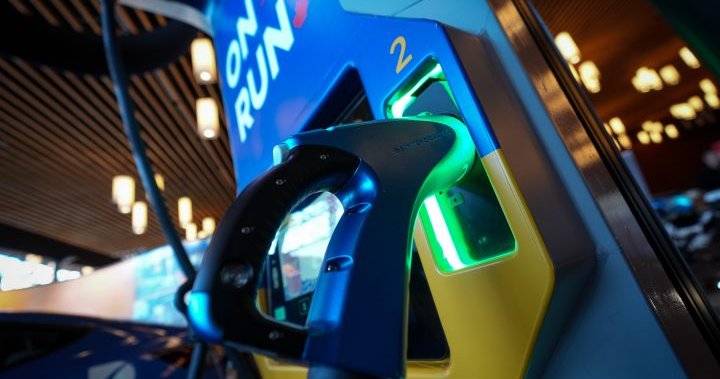Now that Canada has mandated that all vehicles sold in the country by 2035 must have zero emissions, consumers may be wondering how far they can actually go in an electric vehicle.
While “range anxiety” used to be a factor in purchasing an electric vehicle years ago given their novelty and limited charging infrastructure, times have changed and consumers have less to worry about how far their EV can go, experts told Global News.
“Range has improved,” said Mark Marmer, the owner and founder of energy consultant Signature Electric. “Now most cars and trucks have at least about a 300- to 350-kilometre range, which is a reasonably comfortable thing.”
That’s compared with eight to 10 years ago, when EVs only had a range of 150 to 200 kilometres, Marmer said. He said most people drive 50 to 100 kilometres in a day, so it is now pretty easy to make that work with an EV when you have at-home charging you can do overnight.
But what about cross-country trips? A drive from Toronto to Montreal is about 540 kilometres, meaning that at least one charging stop will be necessary.
Luckily, chargers are readily available along most major corridors, Marmer said, and can usually be found just off the highway, such as at some Tim Hortons or McDonald’s. Gas stations are beginning to offer chargers as well, he noted, with ONroute locations in Ontario as an example.
Get the latest National news.
Sent to your email, every day.
Marmer says that Tesla EVs have the best range, with the Model 3 sedan featuring a range of 420 kilometres, according to Electric Vehicle Database, and the Model Y Performance sitting at 415 kilometres of range. That’s because they have been in the market a long time and have experience in the field, Marmer said.
Other makes include the Honda Ioniq 6, with a standard range of 365 km, the base model Nissan Leaf at 235 km, Polestar 2 at 405 km, and Lucid Air Pure at 560 km, according to the database.
When on a longer trip, a charge to give an extra 150 kilometres or so will take about 15 to 20 minutes, but that also depends on the speed of the charger, according to Marmer.
That is still much improved from a prior time of about 45 minutes, and he expects charging times to keep improving so it can get to the point where it is not much different from the time it takes to fill up with gas, as well as for the range to improve too.
Longer trips do require some planning to make sure you have charging stations before you run out of juice, he noted, but said it is something EV owners quickly get used to.
Some brands like Tesla even do it for you, telling you where to stop and for how long, and can adjust on the fly.
Many EVs give you an option when purchasing to upgrade your range for a couple of thousand dollars, according to Louise Lévesque, the policy director of industry association Electric Mobility Canada. She said that there’s usually a standard range that will give about 350 to 450 kilometres, then a long range that is closer to 500 kilometres and above.
She says that for most people, the standard range is fine as it is easy to find charging stations if you’re not going too far. However, some prefer the longer range to ease anxieties or if they know they’ll travel long distances often.
Then there’s the question of how Canada’s cold weather will affect your battery life. Lévesque said that colder weather will consume more energy from your EV due to the use of heating and the road conditions that require more traction. She said the average drop in battery life is about 20 to 25 per cent but you may see about a 40 per cent reduction in battery life in -20 C.
That may mean a challenge for long-distance driving in some parts of Canada, such as through Saskatchewan, where there may not be as many charging stations and the temperature can really drop down in the winter, Lévesque said.
She is looking to the future and Canada’s push to have more EV sales, which she said will create market predictability and help with planning more infrastructure. There is also the option of opting for a hybrid electric vehicle, which usually has about 50 km of battery range but well over 500 km with gas, according to BC Hydro.
When asked why many Canadians still are not interested in EVs — there is some suggestion of declining interest, a recent Auto Trader report found — Lévesque said a major reason is lack of knowledge, they haven’t test-driven one, or have read bad press.
“It’s new and we’re on a learning curve,” she said. “But there’s something really, really sweet about sitting in an electric car and putting down that pedal and that thing will just take off and it’s silent. … It’s ninja sweet.”
© 2023 Global News, a division of Corus Entertainment Inc.




